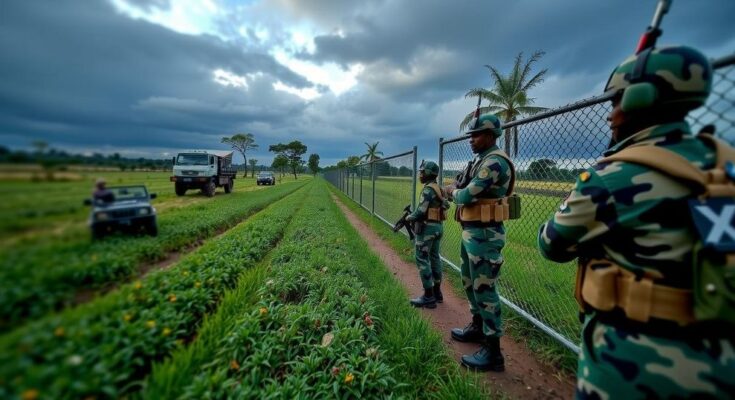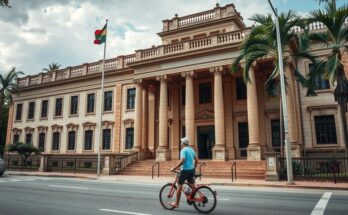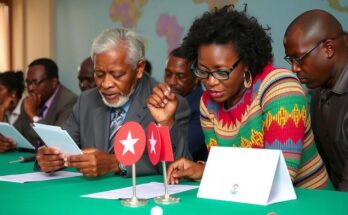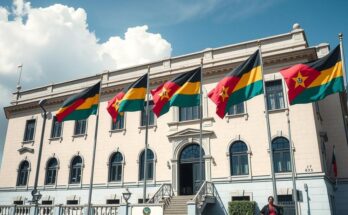Tanzania has successfully stabilized its southern border regions, notably Lindi, Mtwara, Pwani, and Ruvuma, following years of volatility. Recent presidential visits and the revival of local trade suggest a return to stability amid ongoing challenges in Mozambique. The Tanzanian government aims to enhance local prosperity through the Mtwara development corridor plan while addressing sentiments of marginalization that historically provoke conflict. Continued engagement with local communities is essential to prevent future unrest and ensure equitable benefits from resource projects.
In recent times, Tanzania has made commendable strides in stabilizing its southern borders despite challenges faced in Mozambique. The security situation in the southern regions of Lindi, Mtwara, Pwani, and Ruvuma, previously fluid and unpredictable, has improved markedly due to proactive law enforcement measures. Notably, President Samia Suluhu Hassan’s visits to these regions suggest a return to a semblance of peace reminiscent of a decade ago. Following a series of serious cross-border attacks prior to the 2020 elections, security forces have successfully suppressed significant criminal activity and restored some business operations, indicating enhanced stability.
Moreover, the end of the Southern African Development Community (SADC) Mission in Mozambique has not adversely affected Tanzania’s security. Renewed cross-border trade has been evident, with products re-entering Tanzanian markets, further signaling a recovery in economic activities across the region. However, challenges remain as the roots of past conflicts highlight the continuing sentiments of marginalization among the residents of Lindi and Mtwara, accentuated by historical grievances and a high rate of poverty.
To address these grievances, the Tanzanian government has introduced the Mtwara development corridor plan, which aims to revitalize the local economy through improved infrastructure and energy supply. The ambitious plan seeks to secure investment in the Liquefied Natural Gas (LNG) project, which could potentially drive economic transformation. However, the ongoing conflict in Mozambique poses a strategic risk to these developments. A comprehensive approach to local community engagement and benefit-sharing from these projects is essential to prevent any resurgence of violence driven by exclusion and marginalization.
In conclusion, while Tanzania displays notable progress in stabilizing its southern border, significant attention must be given to the historical grievances and changing dynamics in the region. The interplay between national security, economic development, and community inclusivity will be central to sustaining the peace. Continuous efforts and robust frameworks must be established to ensure that development projects, particularly in the LNG sector, provide tangible benefits to local populations and address underlying issues that may provoke future unrest.
The security situation in Tanzania’s southern regions—Lindi, Mtwara, Pwani, and Ruvuma—had been unstable between 2020 and 2021, compounded by an increase in cross-border criminal activities. A notable violent insurgency emerging from the Pwani region had posed significant threats to national security, prompting presidential caution during electoral campaigns. The strategic importance of these areas for Tanzania’s national stability is underscored by their history of socio-political grievances and struggles for economic equality, particularly related to natural resource exploitation and infrastructure development. Recent government initiatives aim to address these issues while promoting regional stability and security, particularly in light of ongoing conflicts in neighboring Mozambique.
In sum, Tanzania’s progress in stabilizing its southern border reflects a concerted effort by authorities to regain control over regions previously plagued by violence. The recent visits by President Samia Suluhu Hassan and the resurgence of local trade indicate a renewed confidence among the populace and the government. However, to maintain this stability, it is crucial to continue addressing the historical grievances of marginalization among the affected communities through inclusive development policies and local engagement. The successful execution of the Mtwara development corridor plan and the LNG project will be pivotal in solidifying peace and ensuring sustainable economic growth in the region.
Original Source: thechanzo.com




